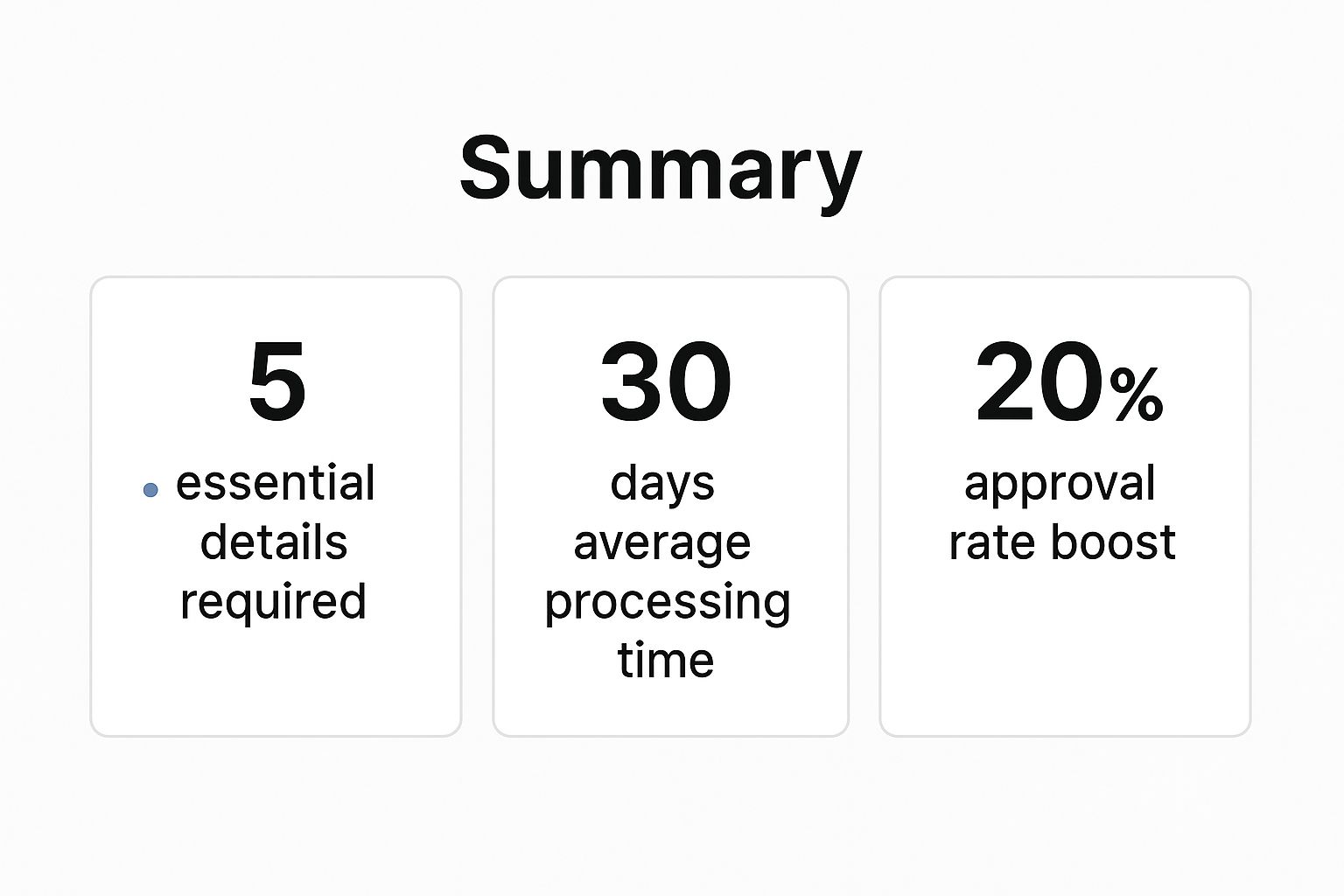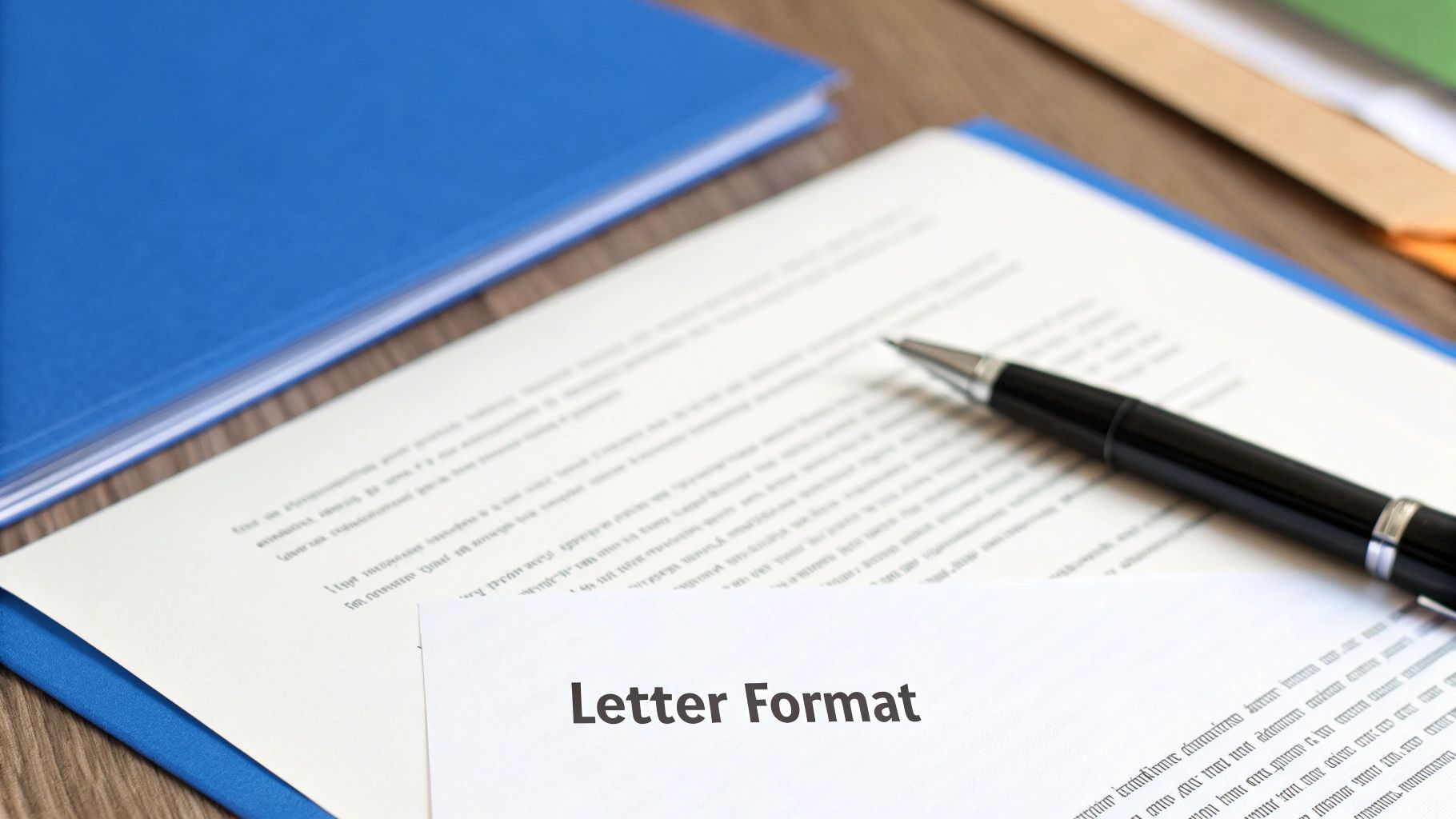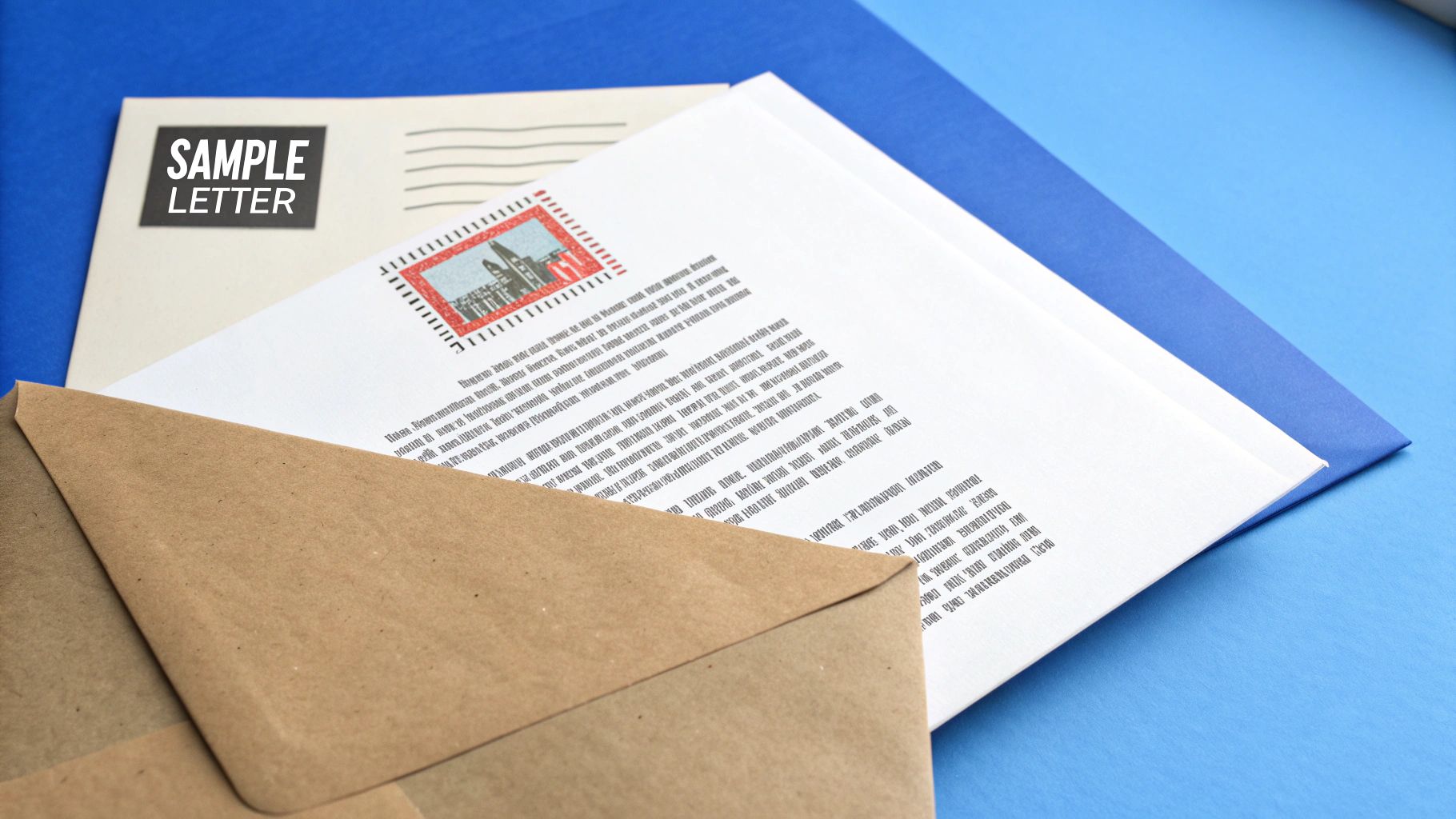Invitation Letter for Visa: A Complete Guide for Nigerians

So, you want to invite a friend, family member, or business partner to visit you in another country, and you've heard you need an "invitation letter for a visa". What exactly is it? Think of it as a formal, personal letter from you—a Nigerian living abroad or even in Nigeria inviting a foreigner—to the embassy or consulate of the country your guest wants to visit. You're essentially vouching for them, confirming you've invited them, and often, that you'll be taking care of them during their stay. It’s a key document that explains the "why" and "how" of their trip.
Why Your Invitation Letter Is More Than Just Paperwork

It’s easy to see the invitation letter as just another piece of paper in the stressful pile of visa application documents. But from my experience helping countless Nigerians, it’s one of the most powerful tools you have. This letter is your personal guarantee to the visa officer, turning an otherwise impersonal application into a genuine, human request.
You're basically telling the visa officer, "Oga, I know this person well. They are coming to stay with me, and I will be responsible for them. I guarantee they have a good reason to visit and will go back home when they're done." That personal touch adds a layer of trust that no official form can ever match.
The Real Impact on Visa Decisions
The numbers don't lie. Data from various embassies shows that visa applications from Nigeria supported by a strong invitation letter have a significantly higher approval rate. For example, for UK and Schengen visas, a well-written invitation can increase the chances of approval by over 30%. Why? Because a good letter directly answers the three biggest questions on any visa officer’s mind:
- Why are they visiting? Is it for a legitimate reason like attending a wedding in Lagos, a graduation in London, or a business meeting in Abuja?
- Who is paying for the trip? Can they afford it, or will you be covering their costs? The visa officer needs to be sure they won't become a financial burden.
- Will they leave when the visa expires? What proof is there that they'll return to their home country?
Your invitation letter is your chance to answer these questions confidently before they are even asked, giving the consular officer the assurance they need to stamp that visa.
Let's imagine you’re a Nigerian living in Canada and you want to invite your mother from Ibadan for your child's dedication ceremony. Your letter would explain your relationship, the special occasion, and confirm she'll be staying with you in your Toronto apartment. Or maybe your tech company in Yaba is inviting a software developer from Kenya for a three-week project. The letter must outline the professional reason for the visit and the specific work they'll be doing.
In both scenarios, the letter provides the crucial context that can be the deciding factor between a visa approval and a heartbreaking rejection. For more context, it's always useful to keep up with current visa statistics and travel trends.
Core Components of a Convincing Invitation Letter
When you're writing an invitation letter for a visa, think of it as your personal endorsement. You're telling the consular officer, "I know this person, I am vouching for them, and here are all the details to prove it." Getting this right is critical, as a weak or incomplete letter can cause serious delays or even get the application thrown out.
The letter boils down to two main parts: information about you (the host) and information about your guest (the applicant). You have to get both sections perfect.
This quick guide breaks down what you need to include to make your letter clear and effective.

As you can see, a few key details can make all the difference, smoothing out the entire visa process for your guest.
Information About You, The Host
First, you need to establish who you are. The embassy needs to see that you're a real person with the legal status to host a visitor in their country. Be precise and provide verifiable details—this is where your credibility starts.
You'll need to clearly state:
- Your Full Name: Make sure it's written exactly as it appears on your official documents, like your Nigerian international passport data page or your residence permit.
- Your Full Address: Don't be vague. Instead of just "Manchester, UK," write out the full address: house number, street name, city, and postal code.
- Your Contact Information: A working phone number and an active email address are non-negotiable.
- Proof of Your Status: You must clearly state your immigration status in the host country. Are you a citizen, a permanent resident, or on a work/student visa? I always recommend including a copy of your passport data page or residence permit to strengthen your letter.
Details About Your Guest, The Applicant
Just as your information is vital, the details about your guest are equally important. The consular officer needs to know exactly who you're inviting. This part of the letter creates a direct, credible link between you and the applicant.
For your guest, you must provide:
- Their Full Name: Double-check the spelling to ensure it perfectly matches what’s on their Nigerian passport.
- Their Passport Details: This includes their passport number, the date it was issued, and the expiry date.
- Your Relationship: Be specific. Is this person your mother, a childhood friend from university days, a business partner, or your brother? A clear definition of your relationship makes the invitation feel genuine and adds authenticity.
While a strong invitation letter is a support document, it's worth noting how it differs from other application paperwork. For instance, understanding the purpose of a letter of intent for a visa application can be useful for other travel scenarios.
To keep everything organised, using a simple checklist helps ensure no detail is missed.
Checklist for Host and Applicant Information
This table breaks down the essential details you'll need for both yourself and your guest. Running through this before you start writing can save you a lot of headaches.
| Information Category | Details for the Host (in Host Country) | Details for the Guest (Applicant in Nigeria) |
|---|---|---|
| Personal Identity | Full name as on official ID/passport | Full name as on passport |
| Address | Complete residential address abroad | Current residential address in Nigeria |
| Contact | Phone number and email in host country | Nigerian phone number and email |
| Official Status | Copy of passport or residence permit | Passport number, issue & expiry dates |
| Relationship | N/A | Specific relationship to the host (e.g., Mother, Friend) |
Using this checklist ensures you've covered all the fundamental requirements, making your letter more structured and easier for the embassy staff to review.
How to Structure Your Letter for Maximum Impact

A really effective invitation letter isn’t just a random collection of facts; it tells a clear, logical story. I always advise people to think of it in three parts: a direct opening, a detailed middle, and a solid closing. When you get this structure right, you make the consular officer's job easy, and that’s exactly what you want.
Your introduction is your first impression, so make it count. Go straight to the point. Clearly state who you are, who you're inviting, and why they're coming. Vagueness is your enemy here—clarity is everything.
Crafting a Compelling Introduction and Body
The very first paragraph needs to answer the visa officer's immediate question: "What is this letter about?" For instance, if you’re inviting your father from Abuja to visit you in Houston for his 70th birthday celebration, say that upfront. No need to beat around the bush.
The body of the letter is where you fill in the details. This is your chance to explain your relationship with the person you’re inviting and lay out a simple, believable plan for their stay. You don't need a minute-by-minute itinerary, but you do need to show you’ve thought it through.
- Explain the relationship: Be specific. "My mother, Mrs. Funke Adewale, will be visiting…" or "My business associate from my Lagos office, Mr. Emeka Okafor, will be attending…"
- Outline the visit: Mention key dates, how long they plan to stay, and the main activities.
- Provide accommodation details: A simple line works perfectly. "He will be staying with me at my residence in Peckham, London, throughout his three-week visit."
Your letter isn't just a document; it's a reflection of your credibility as a host. Every detail, from the purpose of the visit to your financial declaration, builds a case of trust and responsibility in the eyes of the embassy.
Declaring Financial Responsibility
Now, let's talk about the most important part of the letter: money. The embassy needs to know, without any doubt, that your guest won’t become a financial burden on their country. You have to be direct and clear about who is paying for the trip.
A strong statement of financial support is non-negotiable. Here’s an example: "I will be fully responsible for all of my mother's expenses during her stay in the UK. This includes her return flight ticket from Lagos to London, accommodation at my home, daily feeding, and any other costs she may incur."
These letters play a massive role in connecting families, especially within the Nigerian diaspora. Many Nigerians abroad send money home, and a significant portion of these connections are strengthened by family visits made possible by these visas. Strong diaspora ties are a huge social and economic driver, a fact highlighted in studies about the impact of diaspora connections.
Gathering Your Essential Supporting Documents
Think of your invitation letter as the compelling cover of a book. It’s powerful, but it can’t stand alone. The real proof—the evidence that your story is true—is in the supporting documents you provide. These documents build a rock-solid case for your guest.
When you attach the right paperwork, you’re showing the consular officer that you're a credible host with the genuine ability to support your visitor. This isn't just about bundling papers together; each document has a specific job. For Nigerians inviting friends or family, this is your moment to clearly demonstrate your status, financial stability, and your established life abroad.
Your Credibility Checklist
To make your invitation letter truly convincing, you need to back it up with clear, verifiable proof of who you are and your status in the host country.
Here’s a breakdown of what you'll almost always need to include:
-
Proof of Identity & Status: A sharp, scanned copy of your international passport's data page (Nigerian or foreign) and a copy of your valid visa or residence permit (e.g., UK Biometric Residence Permit, US Green Card).
-
Proof of Address: You'll need a recent utility bill (like electricity or council tax) or a tenancy agreement that clearly shows your current address. Make sure this address is exactly the same as the one you wrote in your letter.
-
Evidence of Financial Capacity: This is where you prove you can afford to host someone. You’ll need a letter from your employer confirming your job and salary, along with recent bank statements (usually the last three to six months) showing a stable income. If you're self-employed, provide business registration documents and business bank statements.
If you're writing an invitation for business purposes on behalf of your company, it's vital to include your company’s registration certificate (e.g., Corporate Affairs Commission – CAC if in Nigeria) to prove your business is legitimate.
The whole point of these documents is to paint a complete, trustworthy picture of you as the host. When a visa officer can easily confirm your identity, where you live, and your financial stability, the entire application is viewed more positively.
This isn’t just talk. Statistics consistently show that well-supported invitation letters dramatically increase the chances of a successful visa application for Nigerians. A well-prepared application package can be the difference between success and failure.
It's also smart to stay informed about changing rules. Keeping an eye on things like the new travel rules to Europe can help you prepare for future travel requirements.
Common Mistakes Nigerians Should Avoid

When you're writing an invitation letter for a visa, even a small mistake can land the application in the rejection pile. It's incredibly frustrating, especially because most of these errors are completely avoidable once you know what to watch out for.
Let's walk through some of the most common mistakes that can ruin your guest's visa chances.
One of the biggest problems is being vague. A simple line like, "I am inviting my friend to visit me," won't work. It leaves the visa officer with too many questions. They won't waste time trying to figure it out. You must be crystal clear about the purpose of the visit, how long they will stay, and who is paying for everything.
Another classic mistake is being too casual. Your letter should feel sincere, but avoid slang and overly familiar language. This is a formal document, not a WhatsApp chat. Writing something like, "My guy is coming over to chill for a bit," is a guaranteed way to not be taken seriously.
Getting the Details Right
It sounds basic, but you'd be surprised how many people forget to sign the letter or leave out their contact details. An unsigned letter is useless. If the embassy can't see your address and phone number to verify you're a real person, it immediately raises red flags.
Your main job is to remove any doubt from the visa officer's mind. Every small mistake gives them a reason to question if the visit is legitimate.
Here's how to fix some common vague statements:
- Vague Purpose: Don't just say, "for a holiday." Instead, write something specific like, "to attend my graduation ceremony from the University of Manchester on 15 July 2024, and to tour the city with me for two weeks afterward."
- Weak Financial Proof: Avoid saying, "I will take care of the expenses." Be explicit: "I will be fully responsible for all accommodation, feeding, and local transportation costs during his stay, as demonstrated by my attached bank statements and employment letter."
Avoiding these simple mistakes is half the battle won. If you want to understand more about why applications fail, it's worth reading up on the top visa rejection reasons so you can avoid them from the start.
Common Questions About Invitation Letters
When it comes to writing an invitation letter for a visa, plenty of questions come up. It’s completely normal to feel unsure. Let's tackle some of the common queries I hear from Nigerians to help you get this right.
Do I Need to Notarise the Letter?
This is probably the most frequent question. Does the letter need a court stamp from a notary public? For most countries popular with Nigerians, like the UK, US, and Canada, the answer is no. An invitation letter does not need to be notarised. The visa officer is far more interested in the genuine story and the supporting documents you provide, not a legal stamp.
Practical Worries: Email vs. Post, Students, and Bank Balances
What about sending the letter? Is a physical copy sent from abroad necessary? In almost all modern applications, a clear, scanned PDF copy sent via email is perfectly fine. Your family member or friend in Nigeria can print it out and include it with their application. This saves you the time, stress, and cost of using DHL or a courier service.
Another common scenario is students wanting to invite their parents for graduation. If you're a Nigerian studying abroad, you can absolutely write an invitation letter. Just make sure you include strong proof of your student status—like your student ID card, a letter from your university, and your visa/BRP. You’ll also need to be very clear about how the trip will be funded, whether from your own part-time work savings or your parents' funds.
The strength of your invitation isn't about your age or student status. It's about providing clear, believable information and the evidence to back it up.
Now, let's talk about money. The "how much is enough?" question. Sponsors often worry about the specific amount they need in their bank account. There isn't a magic number. What visa officers look for is a bank balance that can realistically cover your guest's expenses for the duration of their stay without leaving you broke. A stable account history with regular income over several months is always more convincing than a large sum of money that just appeared last week (an issue known as "funds parking").
Staying on top of immigration rules is crucial, as they can change. For anyone looking at the UK, you can get some great insights from our guide on the new UK immigration white paper and what it means for Nigerians.
Ready to take the guesswork out of your immigration plans? Let JapaChat be your guide. As Nigeria's AI immigration expert, we provide instant, accurate answers to all your visa and relocation questions. Start planning your journey with confidence today. Get started for free at JapaChat.

Leave a Reply